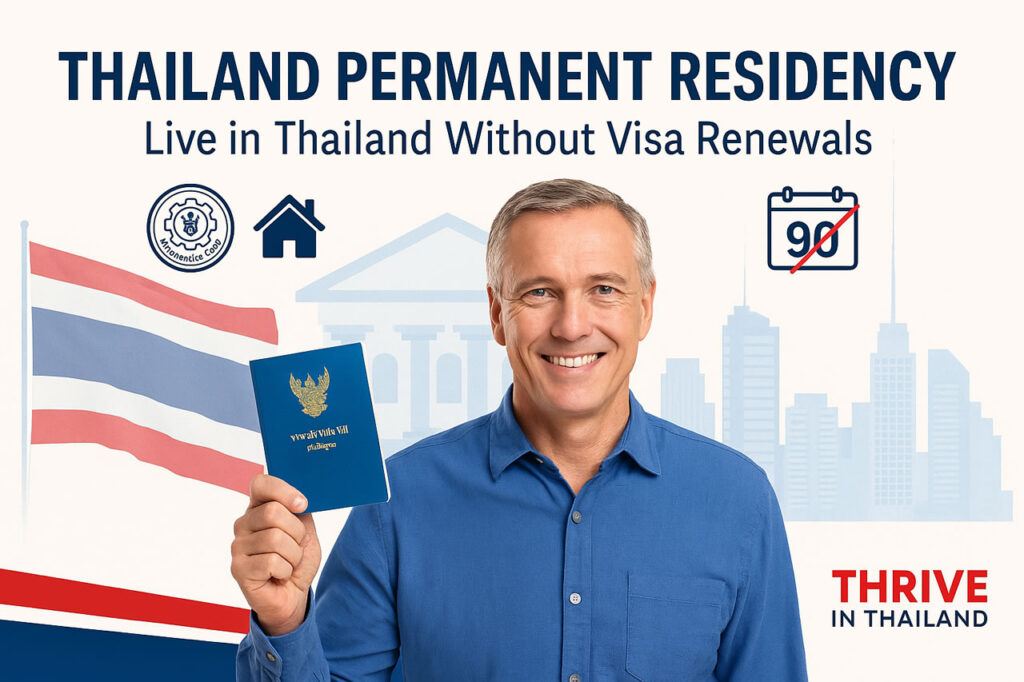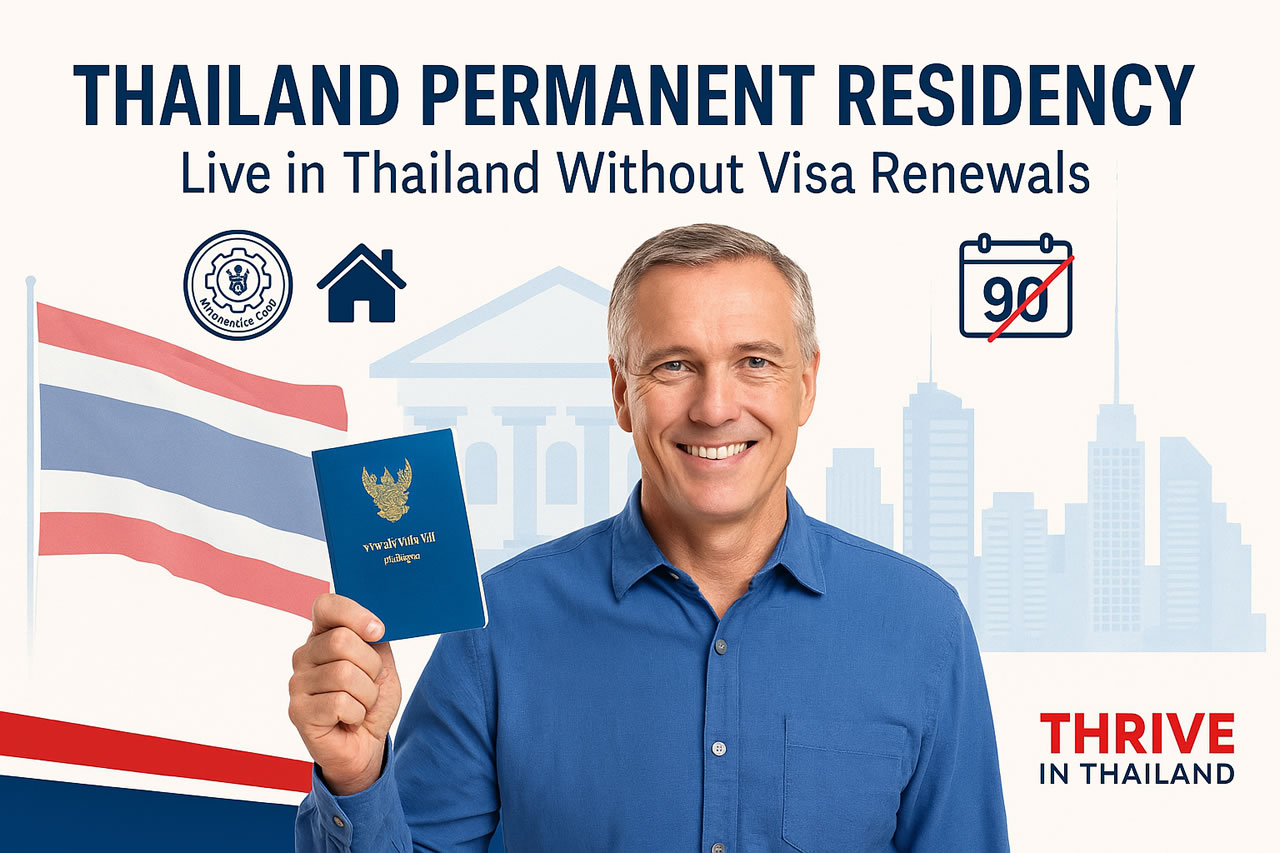Table of Contents
- The Key Benefits of Thai Permanent Residency
- Who’s Eligible for Thai Permanent Residency?
- The Thai Permanent Residency Application Process
- How Much Does Thai Permanent Residency Cost?
- Frequently Asked Questions About Thai Permanent Residency
If you’re tired of juggling visa renewals, 90-day reports, and immigration red tape, Thailand’s Permanent Residency (PR) could be the long-term solution you’ve been waiting for. Designed for expats ready to put down real roots in the Land of Smiles, Thai PR offers stability, status, and a more integrated way of life. In this guide, we’ll break down everything you need to know — from who qualifies and how to apply, to what you’ll gain once you have your residence permit in Thailand. With only 100 spots available per nationality each year, it pays to plan ahead.

Why Apply for Thai Permanent Residency? The Key Benefits
Thai Permanent Residency comes with a host of long-term advantages that make life in Thailand far more stable and integrated. First and foremost, you’ll no longer need to worry about visa renewals, re-entry permits, or annual extensions — your right to stay is indefinite.
As a PR holder, you can:
- Be listed on a Thai house registration document (Tabien Baan), which simplifies many legal and administrative processes.
- Apply for a Thai work permit more easily if you wish to work legally in Thailand.
- Purchase a condominium in your own name without needing to transfer funds from abroad.
- Register your residence and obtain an Alien Book, Thailand’s version of a foreign resident ID.
Permanent residency also cuts down significantly on bureaucratic hurdles. Whether you’re opening a bank account, applying for a loan, signing rental contracts, or even enrolling your children in school, having PR status can smooth the way and reduce delays. You’ll be seen as more established and reliable in the eyes of Thai institutions.
While you’re still not allowed to own land directly under your name, there are common workarounds:
- You can own a condo unit outright.
- You can own a building on leased land.
- You may hold land through a Thai limited company where you are a shareholder (with proper legal structure and advice).
Also note: PR holders must still complete 90-day reporting, just like most other long-stay visa holders. And although this status is permanent and doesn’t expire, it can be revoked for serious legal violations or failure to comply with immigration rules.
Who’s Eligible for Thai Permanent Residency?
If you’re planning to stay in Thailand long-term and want to apply for Permanent Residency (PR), you’ll need to meet a combination of general requirements and category-specific qualifications. The Thai government offers several routes to PR, including pathways based on investment, employment, family ties, special expertise, or unique contributions to the country.
General Eligibility Requirements
To apply for permanent residency in Thailand, you must meet the following base criteria, regardless of the category you’re applying under:
- Be at least 14 years old
Applicants must be legally considered mature enough to hold permanent residency rights under Thai law.
- Hold a Non-Immigrant Visa for 3 consecutive years
You must have maintained a valid non-immigrant visa (such as a business, marriage, or retirement visa) and extended it continuously for at least three years before applying. Tourist visas do not count.
- Pass a criminal background check and submit fingerprints
Thai immigration authorities require a clean police record. You’ll need to provide fingerprints as part of your criminal clearance process.
- Demonstrate Thai language ability
A spoken interview in Thai is part of the application process. While fluency isn’t required, you should be able to understand and respond to basic questions.
- Provide key documents
These include:- A complete copy of every page of your current passport
- A signed Personal Data Form
- A health certificate dated within the last three months
- TM6 departure/arrival cards (if still in use or available)
Important: Failure to meet these base requirements will disqualify you from applying, regardless of your financial status or family connections.
Application Categories
Once you meet the general criteria, you must apply under one of the following categories:
1. Investment Category
This route is ideal for foreigners who have made significant financial contributions to Thailand’s economy.
- Investment threshold: You must have invested at least 10 million THB, with funds transferred from overseas into Thailand.
- Qualifying investments: These may include equity in limited or public companies, government bonds, or shares listed on the Thai Stock Exchange.
- Ongoing requirement: After approval, you must submit proof of your active investment to the immigration office every year for three consecutive years.
2. Employment Category
This path is suited to individuals working in Thailand, especially those in senior positions or earning a high income.
Option A: Executive Role
- Must hold a senior position in a Thai-registered company with at least 10 million THB in capital.
- You must have served as an authorized signatory for a minimum of one year before applying.
- Your monthly income must be at least 50,000 THB for the last two consecutive years, and backed by income tax filings.
Option B: General Employment
- You must have held a valid Thai work permit for at least three years.
- Employed by the same company for at least one year prior to submission.
- You must have earned:
- At least 80,000 THB/month for two years, or
- Paid a minimum of 100,000 THB per year in income tax for two years.
3. Expertise Category
This route is designed for highly skilled individuals whose knowledge or professional skills are deemed beneficial to Thailand.
- You must hold at least a bachelor’s degree or equivalent in your field.
- Your expertise must be endorsed by a Thai government authority, confirming its relevance and value to the country.
- You should have worked in a position using this expertise for at least three years prior to applying.
4. Family or Humanitarian Grounds
If you have close family ties to a Thai citizen or permanent resident, you may qualify under this category.
Spouses of Thai Nationals
- You must be legally married for at least two years and have a biological child together.
- If you don’t have a child, you must be married for at least five years (or provide medical proof of infertility).
- You or your spouse must earn a combined minimum income of 30,000 THB/month, consistently over the last two years, with tax documentation.
Elderly Spouses (Age 50+)
- Must be married for at least two years.
- Required income: 65,000 THB/month for two years with tax filings.
Children Applying Under Thai Parents
- Must be the biological child of the Thai parent and be single and under 20 years of age.
- If over 20, you may still qualify if you’re a university student or have a condition requiring parental care, with supporting evidence.
- The parent must earn 30,000 THB/month for two years, with tax proof.
Parents Applying Under Thai Children
- You must be the biological parent of the Thai child.
- Must be at least 50 years old at the time of application.
- The child must have a stable income of 30,000 THB/month over the past two years with tax records.
5. Miscellaneous / Exceptional Contribution
This is a discretionary category for individuals who don’t fit into the other boxes but have made significant contributions to Thailand.
- This might include cultural, academic, or economic achievements recognized by a national institution.
- Applications under this route are reviewed case by case by the Thai Immigration Commission.
- You must provide compelling documentation of your contribution and relevance to the country.
Quick Tip: If you’re unsure which category you qualify under, a Thai immigration lawyer or specialist can help match your background to the most appropriate route.
The Thai Permanent Residency Application Process
Applying for Thai Permanent Residency isn’t just about ticking boxes — it’s a formal, multi-step process that requires preparation, patience, and paperwork. Understanding the flow of the application will help you stay organized and avoid unnecessary delays.
1. Application Period
- The window to apply for Thai PR usually opens once a year, typically from October or November through to the end of December.
- There is an annual quota of only 100 approvals per nationality, so timing matters — if you miss the deadline, you’ll need to wait until the following year.
Tip: Set a reminder to check immigration announcements around October each year. Applications must be submitted in person at the Immigration Bureau in Bangkok (Division 1).
2. Prepare Your Documents
Before submitting your application, gather the following essentials:
- Completed PR application form
- Full copy of your passport, every page
- Personal Data Form
- Valid health certificate (issued within 3 months of submission)
- TM6 arrival/departure cards, if still issued
- Criminal background clearance (Thai and possibly your home country)
- Proof of Thai language proficiency (you’ll be tested during the interview)
- Category-specific documents, such as:
- Tax returns
- Marriage certificate
- Employment contract or corporate registration
- Bank or investment statements
Immigration officers may request additional documents depending on your case. It’s best to consult a legal advisor or immigration expert to ensure you’re fully prepared.
3. Interview & Language Test
Once your paperwork is accepted, you’ll be invited for an interview conducted in Thai. This is not a formal exam but a spoken Thai language assessment to verify your ability to communicate and understand everyday language.
- You’ll be asked basic personal and situational questions.
- The session may be recorded and will be attended by immigration officials.
Tip: You don’t need to be fluent, but practicing common questions in Thai before the interview will boost your confidence.
4. Wait for the Decision
After your interview, your application is submitted to the Royal Thai Immigration Commission for review. The process can take anywhere from 6 to 12 months, or even longer, depending on your nationality and the complexity of your application.
During this time:
- You must maintain your non-immigrant visa status.
- Immigration may request additional supporting documents or clarifications.
5. Receive Your Blue Book (PR Certificate)
If your application is approved, you’ll be issued:
- A Blue Residence Book (known as Tabien Baan for foreigners)
- An Alien Book (akin to a Thai ID card for foreign PR holders)
With these documents, you can officially register your residence in Thailand and begin enjoying the full benefits of PR status.
6. What Happens After Approval?
- You must still complete 90-day reporting (same as other long-term visa holders).
- If you applied through the investment route, you’ll need to submit annual investment proofs for three consecutive years.
- You may now apply for Thai citizenship, provided you meet additional requirements (more on that in a future post).
Good to Know: Permanent Residency does not expire, but it can be revoked if you commit a criminal offense, violate immigration rules, or fail to meet post-approval conditions.
How Much Does Thai Permanent Residency Cost?
One of the most common questions from expats considering Thai Permanent Residency is, “How much does it actually cost?” While the benefits are long-term, the upfront fees can be substantial — so it’s important to know what you’re signing up for.
Here’s a breakdown of the costs involved in the Thai PR process:
Application Fee
- 7,600 THB
This is the non-refundable application fee paid at the time of submission. It covers administrative processing and is required regardless of whether your application is approved.
Residence Permit Fee
If your application is approved, you’ll need to pay an additional one-time permit fee, which varies depending on your relationship status:
- 191,400 THB – Standard fee for most applicants
- 95,700 THB – Discounted fee for those married to a Thai national or related to a Thai Permanent Resident
Tip: If you’re applying under the family or humanitarian grounds category, be sure to check if you qualify for the reduced rate. Immigration officers will advise you during the process.
📊 Summary of Total Cost
| Cost Type | Amount (THB) |
| Application Fee | 7,600 |
| Residence Permit (Standard) | 191,400 |
| Residence Permit (Spouse/Family) | 95,700 |
| Total (Standard) | 199,000 THB |
| Total (Spouse/Family) | 103,300 THB |
Additional Costs to Consider
While not officially part of the application fee, you may also need to budget for:
- Document translation & certification (especially if using foreign documents)
- Legal or visa consultants, if you hire professional assistance
- Thai language classes or tutors, if you need to improve before your interview
- Travel to Bangkok if you’re based elsewhere in Thailand (applications are processed in person at the Immigration Bureau in Bangkok)
Remember: These costs are a one-time investment in long-term stability. Once approved, there are no renewal fees or visa extension charges — and you’ll avoid many of the recurring costs that come with other visa types.
Frequently Asked Questions About Thai Permanent Residency
If you’re still weighing your options or just want to clarify a few final details, you’re not alone. Here are some of the most frequently asked questions about Thai Permanent Residency — with clear, honest answers to help you decide if PR is right for you.
Do I still need to do 90-day reports if I have PR?
Yes. Even with permanent residency status, you’re still required to complete 90-day reporting at your local immigration office or online. The only way to avoid this entirely is to obtain Thai citizenship.
Can my PR status expire?
No. Thai Permanent Residency is exactly that — permanent. It does not expire and there’s no need to renew it annually. However, it can be revoked under certain conditions, such as committing a criminal offense, violating immigration laws, or failing to comply with specific post-approval obligations (like annual investment proof, if applicable).
Is there a language test? Do I need to speak Thai fluently?
You don’t need to be fluent, but you will be expected to speak and understand basic Thai during an interview with immigration officials. This is to demonstrate that you can communicate effectively for everyday life in Thailand.
Tip: Many applicants take a few months of Thai language lessons before the interview. It’s a good investment — not just for the application, but for daily life too.
Can I reapply if my application is denied?
Yes. If your application is rejected, you can apply again in the next available submission window, which typically runs from October to December each year. Just make sure to correct or strengthen any weak points in your initial application.
Does holding PR make it easier to become a Thai citizen?
Absolutely! PR is a required step if you’re pursuing Thai citizenship by naturalization. Once you’ve held PR for a certain number of years (usually five), you may become eligible to apply for Thai nationality — provided you meet additional requirements.
Can I bring my family with me under PR?
Not automatically. Each family member must qualify and apply individually, either under their own category or through family-based PR routes. Spouses, children, and parents of PR holders may be eligible, but they’ll need to submit a separate application.
Can I own land in Thailand if I have PR?
No, not directly. Thai law prohibits foreigners — even permanent residents — from owning land in their own name. However, you can own a condo, own a building on leased land, or hold land via a Thai company in which you’re a shareholder (under strict legal compliance).
Can I work in Thailand with PR?
Yes. PR makes it easier to obtain a Thai Work Permit, and in some cases, employers may be more willing to hire PR holders due to the reduced visa and sponsorship requirements.
What if I leave Thailand for a long period? Can I lose my PR status?
Yes, it’s possible. While PR is permanent, long-term absences from Thailand without notifying immigration may lead to cancellation of your status. You should maintain regular contact with immigration if you plan extended travel abroad.
What are alternatives to Thai PR?
If you’re not quite ready (or eligible) for PR, here are some long-term visa options:
- Thai Marriage Visa – for those married to Thai citizens (renewable yearly)
- Thai Retirement Visa – for applicants aged 50+ (financial requirements apply)
- Thailand Long-Term Resident (LTR Visa) – for wealthy global citizens, digital nomads, professionals, and retirees
- Thailand Privilege Visa (Elite Visa) – long-term stay with luxury perks, valid 5–20 years
Is Thai Permanent Residency Right for You?
Securing Thai Permanent Residency isn’t just about avoiding visa renewals — it’s a commitment to becoming part of Thai life. Whether you’re a long-time expat tired of paperwork, a professional building a life here, or someone with deep family ties in Thailand, PR offers a level of stability, recognition, and opportunity that no other visa can match.
Of course, the process takes time, patience, and no small amount of paperwork. But for many, the rewards — the ability to stay indefinitely, work with fewer restrictions, buy property, and even pursue Thai citizenship — far outweigh the effort. So if you’re ready to make Thailand more than a temporary home, permanent residency could be the right path forward.
| 📌 Looking for more visa help? |
|---|
| ✅ Thailand Visa Hub – Your central guide to all visa types, rules, and long-term options. |
| ✅ Visa Finder Tool – Answer a few quick questions and see which visa best fits your situation. |
| ✅ Visa Stay Calculator – Check expiry dates, 90-day reports, and plan visa runs with ease. |
What’s Your Take? Have you applied for Thai PR? Are you considering it but unsure about your eligibility? Share your experience or questions in the comments below — your insight could help others navigating the same journey.

